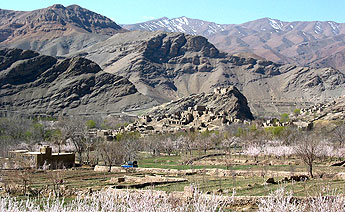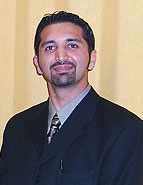
Mostafa Ghous is working with engineering students to help the small village of Lalander, Afghanistan. |
February 27, 2006
Engineering alum works with students to bring water to Afghan village
By Tim Stephens
Mostafa Ghous was five years old when his family fled Afghanistan in 1980 to escape the Soviet invasion. Now, Ghous is using the engineering skills he learned at UCSC to help rebuild the war-torn country where he was born.

Mostafa Ghous |
At the same time, he is helping disadvantaged students in Solano County as director of a program that was crucial to his own academic success.
Ghous earned a B.S. degree in information systems management from UCSC in 2002 and is now the director of the Mathematics, Engineering, Science Achievement (MESA) Program at Solano Community College. MESA is a statewide program that supports educationally disadvantaged students so they can excel in math and science studies and graduate with degrees in engineering, science, and technology.
At Solano Community College, in addition to directing the academic enrichment components of the program, Ghous gets the MESA students involved in projects that combine community service or humanitarian assistance with math, science, and engineering. This year, the focus is on helping the small village of Lalander, Afghanistan, by designing and building pumps that can bring water to the village from a nearby river.
"There is so much destruction in the world, it is important for people to get involved in projects that build communities," Ghous said. "Science itself is amoral, but you can use it for humanitarian purposes. This project emphasizes the humanitarian aspects of engineering."
The villagers in Lalander get their water from nearby rivers and streams. Those who collect the water, usually children, must make their way down a steep cliff and risk stepping on land mines that still remain in the area, which was devastated during the war with the Soviet Union.
The MESA students are working to build self-sufficient pumps that can bring water to the village without using electricity or manpower. After doing some research to decide what kind of pump technology would be most suitable, the team of a dozen students settled on hydraulic ram pump technology, which uses the energy in flowing water to drive the pump.
"The technology has been around for centuries," Ghous said. "We worked with some of the faculty here and built our own pump, which we are now testing."
Eventually, once they have built a final prototype, the team plans to send it to Afghanistan along with blueprints in the local languages so that more pumps can be built in Afghanistan.
To implement this project, the MESA program has teamed up with Trust In Education (TIE), a nonprofit organization that provides educational and economic opportunities in Afghanistan and has been working in Lalander for several years. The Graniterock company is also providing funding for the project.
Ghous has been involved in humanitarian assistance for Afghanistan since he was a student at UCSC, when he and another Afghan student, Masood Sattari, formed a nonprofit group called Engineering and Science Students for the Reconstruction of Afghanistan (ESSRA). Ghous received a Merrill College Service Award for his work with the group, which, among other things, raised $2,000 for an Afghan children's fund.
Ghous and Sattari, who earned his B.A. in economics at UCSC in 2002, learned about TIE through their work with ESSRA.
"We found out they were trying to rebuild this village of Lalander, so we got together with the founder of TIE and came up with the plan to build pumps," Ghous said.
For the MESA students, it is an opportunity to learn how to work as a team through all the phases of an engineering project, from research to final prototype. Although a low-tech water pump has little to do with information technology, Ghous said the project is a perfect use of his degree.
"In information systems management, you learn how to manage people, projects, and technology all together. This project has involved students, faculty, nonprofits, and local businesses, bringing people together to get things accomplished," he said.
MESA programs operate in K-12 schools, community colleges, and universities, and Ghous said they helped him throughout his academic pathway. When he was a student at Modesto Community College, the MESA program there got Ghous interested in engineering, supported him as he struggled through classes while working 50 hours a week, and helped him transfer to UCSC. At UCSC, Ghous worked as academic coordinator for the MESA Schools Program, which does outreach in K-12 classrooms.
"I've been involved with MESA programs for almost 12 years now," he said.
At UCSC, MESA operates through the
Multicultural Engineering Program (MEP) in the Baskin School of Engineering
Additional information about the Lalander Humanitarian Project is available online.
 Email this story
Email this story
 Printer-friendly version
Printer-friendly version
 Return to Front Page
Return to Front Page